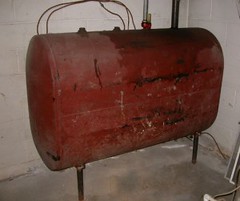June 2012 Archives
Spring 2012
- Kingston's existing home sales will moderate in the next two years to levels that are considered more sustainable and in line with historical norms
- Kingston's existing home average price to increase by 3.4 per cent in 2012 and 2.0 per cent in 2013. This growth rate is less than the average seen in prerecession years, as the number of new-listings outpaces the number of sales.
- At 715 units in 2012 and 670 units in 2013, Kingston's total housing starts are expected to fall gradually to a level consistent with changes in household formation. Rising mortgage carrying costs and reduced spill-over demand from the existing home market will dampen residential construction activity
The full report is available on-line here (pdf):
Wood Energy Technology Transfer Inc. (WETT Inc.) is a non-profit training and education association managed by a volunteer Board of Directors elected by holders of valid WETT certificates.
Through professional training and public education, WETT Inc. promotes the safe and effective use of wood burning systems in Canada.
It's website is here: http://www.wettinc.ca/what.html
It is a training organization that certifies that an inspector has been trained in the proper educational and experience requirements.
It does not provide for any wood burning appliance/stove/fireplace, etc. to be "WETT-Certified" - only the inspector is "certified".
Any conditions written into offers should not refer to any stove or fireplace, etc. being WETT certified.
The condition should merely state that you wish to have a WETT-Certified Inspector provide a report satisfactory to you the buyer in his sole discretion, in the same way that you would word a
home-inspection condition.
Here is another site that should help to clear up any misconceptions:
The most important paragraph on this site may be:
Neither the installation nor the appliance can be WETT certified.
They can, however, be inspected for a variety of purposes, but there is no such thing as a WETT certified appliance. An appliance can be inspected, installed and even maintained by a WETT certified professional, but it cannot be WETT certified., nor can members issue "WETT certificates." Only a certification agency such as ULC, CSA or ITS (WH) can test and list wood burning appliances and venting systems and authorize them to display the logo of the certification agency.
Typically, when people are looking for an insurance type of inspection, a visual inspection is conducted to determine if there is evidence of any problems with the installation. This includes examining clearances, chimney heights and visual signs of deterioration. If there are concerns identified, then the inspector should make a recommendation that the appliance be checked and, if necessary, repaired by a WETT certified technician or chimney sweep.
Yes, Oil tanks are becoming a problem in the sale of Real Estate. Underground oil tanks are out and out impossible. Walk away.
Aboveground Oil tanks are the norm, and simply put, Insurance companies do not like them. If you read the article you will see why. The problem I have, is that most home owners with oil tanks are not aware of the "new regulations".
Here is the section that applies:
It is a legislative requirement prescribed by Ontario Regulation 213/01, "Fuel Oil". Section 7 of the Regulation states:
|
Additional Information:
- This is a mandatory inspection and therefore you must not refuse the inspection service being arranged by a fuel oil distributor.
- Inspection service refusal will prevent fuel oil delivery.
- A person who is the holder of a certificate for that purpose shall carry out the inspection. I.e. An oil burner technician (OBT).
- The certified oil burner technician (OBT) may not necessarily work for the fuel oil distributor but may be an agent or sub-contractor of the Fuel Oil distributor.
- You may contact a fuel oil distributor who is different from the one you currently deal with if you are not satisfied with the service being provided.
- Each distributor is responsible for the inspection performed on their client's heating systems. When you switch to a new distributor you may be required to undergo a new inspection. If you change distributors and the new distributor agrees with the previous inspection report, a new inspection may not be necessary. Check with the new distributor to see if they would accept the previous inspection report.
- Both TSSA and fuel oil industry representatives have developed specific checklists that outline minimum inspection requirements.
- There are also inspection requirements for propane systems and natural gas systems.
- See also Comprehensive inspections - Cost considerations and Comprehensive inspections - Disagreeing with results.
Imagine the home owners surprise when they sell their home with an Oil Tank, for which they have been receiving oil, and the Buyer/Home Inspector/Realtor informs them that their tank "might not" be up to code and we need a TSSA certificate. Imagine their further surprise when they find out the tank and lines do not pass, and they need to be replaced at a cost of approx $1,000. They are now upset with the Buyer/Home Inspector/Realtor, for something that this legislation clearly says is the fuel oil distributors responsibility.
Didn't we see the TSSA's name mentioned in the Propane explosion in Toronto? Are they maybe passing more laws than they are capable of enforcing?
Here is a link to Bob Aaron's article in the Star. The hole in the tank was the size of the tip of a pen...
http://www.yourhome.ca/homes/article/497042
Wallpaper is a highly personal thing. With almost any pattern, you can
love it or hate it. You could go for paisley or tropical flowers, or
maybe something more neutral, with beiges and pale blues in some sort
of geometric pattern. But other people, even in your immediate family,
might not share your taste, whatever it might be.
It seems that whatever one chooses, it can become dated as quickly as the last decade's favorite appliance color. At that point, your choice is to remove it altogether or paint or paper over it.
Anyone who is considering selling a house at any time in the near future, removing old wallpaper is probably the best choice - usually you have to steam it off. If you do that and paint your walls your favorite shade of fuchsia, repainting when it's time to sell is easy, and even if you leave it fuchsia, your buyers can change it inexpensively with a few cans of Benjamin Moore.
But the chances are that most of the people looking at your home will not be enamored of your wallpaper. Their mental calculation of the costs of removing it, restoring the walls and then painting will probably far exceed the actual amount it will take to get rid of the stuff properly.
If you're sloppy and just paint over old wallpaper, it will be evident to any discerning eye. There will be telltale seam lines. And slapping on a coat of paint will make the inevitable removal even more expensive.
So, if you've just purchased a home and are considering wallpaper, think long and hard before you actually hang it. And if you are preparing your house for sale, don't take it personally if your agent or stager recommends that you steam it off the paper you so lovingly chose and put up, and paint.
Just do it.
It seems that whatever one chooses, it can become dated as quickly as the last decade's favorite appliance color. At that point, your choice is to remove it altogether or paint or paper over it.
Anyone who is considering selling a house at any time in the near future, removing old wallpaper is probably the best choice - usually you have to steam it off. If you do that and paint your walls your favorite shade of fuchsia, repainting when it's time to sell is easy, and even if you leave it fuchsia, your buyers can change it inexpensively with a few cans of Benjamin Moore.
But the chances are that most of the people looking at your home will not be enamored of your wallpaper. Their mental calculation of the costs of removing it, restoring the walls and then painting will probably far exceed the actual amount it will take to get rid of the stuff properly.
If you're sloppy and just paint over old wallpaper, it will be evident to any discerning eye. There will be telltale seam lines. And slapping on a coat of paint will make the inevitable removal even more expensive.
So, if you've just purchased a home and are considering wallpaper, think long and hard before you actually hang it. And if you are preparing your house for sale, don't take it personally if your agent or stager recommends that you steam it off the paper you so lovingly chose and put up, and paint.
Just do it.






